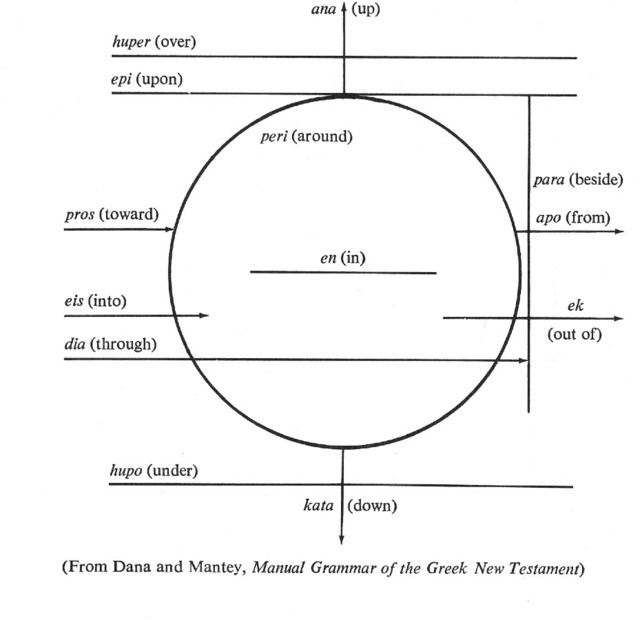BBG 7: Genitive and Dative Cases « Previous • Next » BBG 9: Adjectives

👋🏼 χαῖρετε μαθηταί
Review and Addenda
- Return and review last week’s quiz.
- Check and review workbook exercises 7, esp. parsing and translation
- Mid-term exam is in 2 weeks. Study workbook exercises, and review quizzes.
- Quizzes are 3-hole punched. Why? Save them, as they will be useful in studying for your exams.
- Questions on chapters 7: Inflection, All Cases Definite Article
- Review Chapter 7 Vocabulary
- Chart of all Greek cases on p. 342
- 5 components of parsing
- Complete lexical form: nominative singular, genitive singular ending, definite article
Generic Grammar
- Prepositions - why are they thus called? “Pre - position”, viz. they come immediately before their object.
- States relationship between 2 two words, e.g. “he is under the table”
- Spatially (under, over, beside, out of, away from) - See spatial representation of preposition on p. 339
- Temporally (before, after)
- Logically (“on account of”, etc.)
- Word immediately following is the “object” of the preposition
Greek Grammar
Prepositions
- Function the same as in English, i.e. states relationship between 2 two words, e.g. “he is under the table”
- The relationship may be spatial, temporal, logical et al.
- This diagram is a “rough and ready” way to grasp the spatial meanings of prepositions.

- Not inflected (8.6)
- no changes in form, except for elision)
- Elision - “the expulsion of a short vowel at the end of a word before a word beginning with a vowel. An apostrophe ( ’ ) marks the place where the vowel is elided.” See Smyth on Elision
- the meaning is dependent upon the case of its object
-
must memorize all meanings separately, for prepositions which take more than one case, “__ with the __ means ____”
- e.g. διά + gen. means “through”
- e.g. διά + acc. means “on account of”
-
- case of words which are functioning as objects of preposition is due to what case the preposition takes for that meaning
- case “keywords” do not apply to prepositions
- Prepositional Phrases
- must be considered distinct from the main subject / predicate
- often omit article, may be supplied in translation
Dependent clauses (8.9)
- cannot stand alone
- will never contain main subject and verb in sentence
- introduced by ἵνα and ὅτι
εἰμί and predicate nominatives
- Study of verbs next semester, chapter 15
- Verbs have stems, and endings (the inflection of a verb is called its “conjugation”)
- Verbs must agree with their subject in person (1st, 2nd, 3rd) and number (singular, plural).
- Memorize present indicative of verb to be, εἰμί 8.12, p. 58
- Movable nu
- Predicate Nominative -
Predicate Nominative (8.2, 8.15)
- predicate with verb of being.
- Predicate takes no action, but tells you something about the subject,
- e.g. “Ιησοῦς κυριός ἐστιν.” (note enclitic, and movable nu)
Noun Rules 1-6 (7.12)
- Stem ending in α,η are 1st declension, ending in o are 2nd, consonantal are 3rd
- Neuters are always the same in Nominative and Accusative
- Almost all neuter plurals end in -α
- Iota always subscripts in Dative singular, if possible
- Vowels often change their length (Ablaut)
- Masculine and Neuter always the same in Genitive and Dative
Exegetical Insight
Translation and Parsing
Review Vocabulary
Video Lectures
Assignments
- Continue to read out loud, and practice parsing from the Greek New Testament
- Workbook exercise 8 on Prepositions and εἰμί
- Prepare for quiz next week on everything through chapter 8, specifically:
- Use of prepositions, and prepositional phrases
- Paradigm of εἰμί
- Functions and key words for all cases. (p.344)
- Complete paradigms for case endings and definite article
- Six noun rules
- Full lexical form
- Parsing
- Read and study chapter 9 on Adjectives.
- Review chapters 1-9 - Mid-term Exam in 2 weeks
The Lord's Prayer
ΚΑΤΑ ΜΑθθΑΙΟΝ 6.9-13Πάτερ ἡμῶν ὁ ἐν τοῖς οὐρανοῖς·
ἁγιασθήτω τὸ ὄνομά σου·
ἐλθέτω ἡ βασιλεία σου·
γενηθήτω τὸ θέλημά σου, ὡς ἐν οὐρανῷ καὶ ἐπὶ γῆς·
τὸν ἄρτον ἡμῶν τὸν ἐπιούσιον δὸς ἡμῖν σήμερον·
καὶ ἄφες ἡμῖν τὰ ὀφειλήματα ἡμῶν, ὡς καὶ ἡμεῖς ἀφήκαμεν τοῖς ὀφειλέταις ἡμῶν·
καὶ μὴ εἰσενέγκῃς ἡμᾶς εἰς πειρασμόν, ἀλλὰ ῥῦσαι ἡμᾶς ἀπὸ τοῦ πονηροῦ.
ὅτι σοῦ ἐστιν ἡ βασιλεία καὶ ἡ δύναμις καὶ ἡ δόξα εἰς τοὺς αἰῶνας. ἀμήν. (Erasmian)
 χάρις ὑμῖν καὶ εἰρήνη,
χάρις ὑμῖν καὶ εἰρήνη,Διδάσκαλος Ἀνδρέας